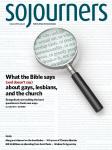IN 1973, IMMEDIATELY following the Yom Kippur War, I watched the movie Exodus. I was so swept up by Leon Uris’ depiction of the Zionist struggle that I wrote in my journal, “The U.S. should do everything it can to defend the state of Israel!”
Two years later, I read a history of the Arab-Israeli conflict in a serialized encyclopedia of World War II. It transformed me into an impassioned defender of Palestinian rights. Clearly, the historical narrative one accepts is critical to determining how a conflict is understood.
Jo Roberts’ book Contested Land, Contested Memory: Israel’s Jews and Arabs and the Ghosts of Catastrophe challenges the nationalist mythologies of both Israelis and Palestinians, peoples largely in denial of each other’s histories. With exhaustive research and numerous personal interviews, Roberts has created a book that is both sensitive to and challenging for partisans of either side.
Roberts begins with the story of an Israeli Jew whose memories of idyllic childhood vacations in a particular village are shattered when she learns from a Palestinian boyfriend that his family was displaced from that village by Israeli soldiers in 1948. Roberts goes on to offer a history of Zionism that is not without its share of heartbreak. From persecution in Catholic Spain to the Dreyfus affair in France and government-sanctioned pogroms in Russia, she reminds us of the prevalence and ferocity of anti-Semitism, which led many to join the movement to create a Jewish state in Palestine. She includes a report to President Truman about 250,000 Holocaust survivors, who in late 1945 were still confined in former slave labor and concentration camps because no country, including the U.S., would accept them as refugees. Roberts makes a convincing case that many Jews went to Palestine because they literally “had nowhere else to go.”
In 1948, modern Israel is born and the Palestinians displaced—700,000 as refugees, 150,000 as internally displaced people. For Israeli Jews the event is a joyful national holiday, while for Palestinians it is the “Nakba” (Catastrophe), disparate depictions contested to this day.
Roberts describes how Israelis tried to erase the memory of their country’s former inhabitants by demolishing hundreds of Palestinian villages and remaking all the maps with new Hebrew names. Israeli history books recast the ethnic cleansing of most Palestinians as a voluntary departure. Meanwhile Palestinian historians dwell on their displacement and either deny or minimize the Holocaust. The disconnect between the two peoples discourages empathy.
For many peace activists, the primary causes of ongoing conflict between the Israelis and Palestinians are Israel’s occupation and settlement of Palestinian and Syrian territory seized in 1967 as well as the unresolved status of Palestinian refugees from 1948. While Roberts acknowledges both problems, she traces the root cause of the conflict to the Zionists’ original aspiration to create a Jewish and democratic state in a land whose residents were primarily not Jewish.
Israel’s self-understanding as a people ever on the verge of extermination feeds its mistreatment of the Palestinians. Roberts writes, “Israeli national identity oscillates between the twin poles of the Holocaust and the Six-Day War, victim and vanquisher—the latter is the antidote to the former. Permanently vulnerable, Israel must respond to any attack with massive force.” Palestinian-Israeli lawyer and journalist Marzuq Halabi agrees: “If you are afraid, and you have power, then you can be very violent, as with the Israeli occupation.” By the same token, if you are traumatized by oppression, as the Palestinians are, and in denial of the other’s suffering, you can be violent as well.
Thankfully, Roberts includes the voices of people who see the conflict differently. In 1921, the religious existentialist philosopher Martin Buber told the Zionist Congress that the Jewish people should announce “its desire to live in peace and brotherhood with the Arab people and to develop the common homeland into a republic in which both peoples will have the possibility of free development.” Unfortunately, the Zionists pursued the creation of an ethnocracy instead, a Jewish state that negates the history and rights of other occupants, a recipe for conflict.
A small minority of Israeli historians and others have come to embrace a post-Zionist vision of Israel: a single state with equal rights for all its present and former inhabitants. They assert that the physical return of the Palestinian refugees would pose enormous problems, including a security risk for Jews. But they also recognize that acknowledging that refugees suffered an injustice that needs redress (some returning to Israel, some receiving reparations, some receiving citizenship from their host countries) would go a long way toward reconciliation.
Contested Land, Contested Memory is at once eye-opening and thoughtful, invaluable for anyone wanting to better understand the Israeli-Palestinian conflict.

Got something to say about what you're reading? We value your feedback!